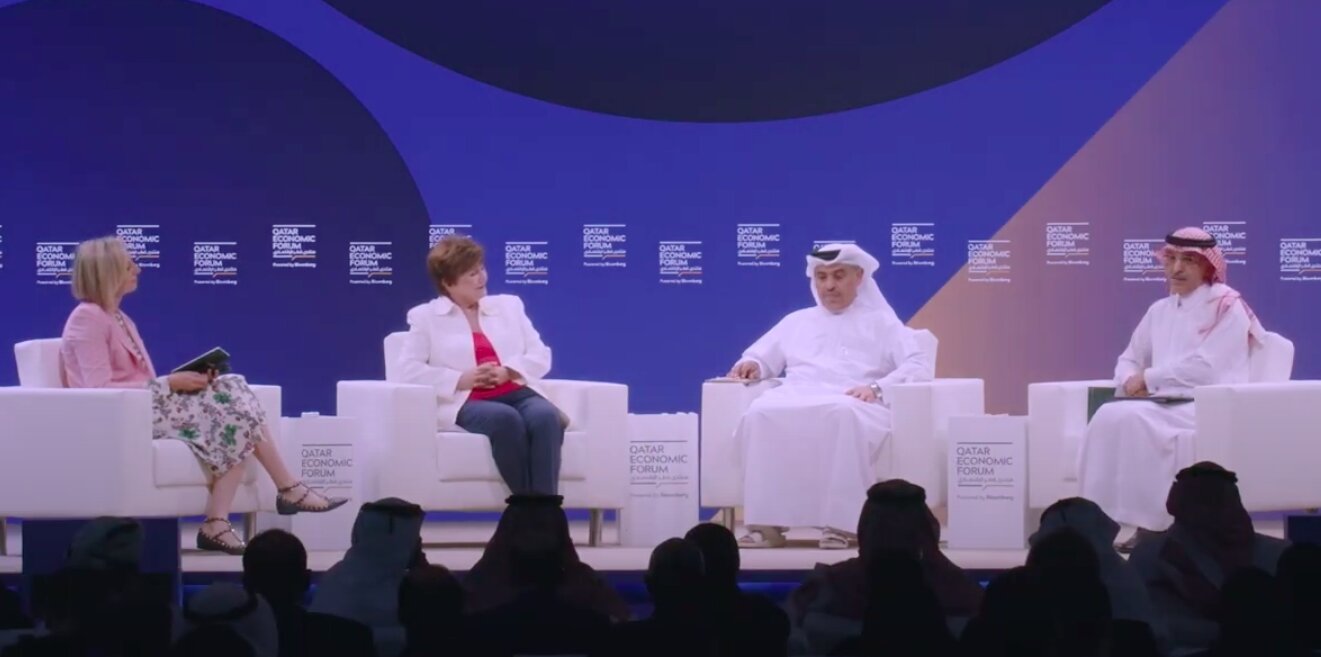Qatar’s FDI this year, the report said Doha’s FDI recorded a 70% annual growth between 2019 and 2022.
The Gulf Cooperation Council (GCC) is “outperforming many advanced economies” due to its long-term strategic approach, Qatar’s Minister of Finance Ali Al-Kuwari said on Wednesday.
Al-Kuwari’s remarks came during a joint panel with his Saudi counterpart Mohammed Al-Jadaan and Kristalina Georgieva, the managing director of the International Monetary Fund (IMF).
The “Maximising the Gulf’s global competitiveness” panel was held at this year’s Qatar Economic Forum (QEF), a platform for dialogue on trends and challenges facing global economies.
The Qatari minister said the region “made substantial investments” in helping ease the way for business operations while creating a “favourable” environment for Foreign Direct Investment (FDI).
“This achievement is not a result of overnight efforts but a result of a long-term strategic approach. As a result, you can witness the region outperforming many advanced economies,” Al-Kuwari said.
In January, Qatar ranked first among the world’s top 10 destinations for FDI.
Offering a promising view on Qatar’s FDI this year, the report said Doha’s FDI recorded a 70% annual growth between 2019 and 2022, with a possible 2.4% increase in 2023. It noted that inflation is also unlikely to surpass 3.3%.
The report listed the top FDI sectors as oil and gas, financial services, and software and information technology.
It said Qatar found “itself in the spotlight of the FIFA World Cup at a time when the local economy has plenty of wind in its sails.”
Speaking at the panel, Al-Kuwari said the major sporting event, the first to ever take place in an Arab and Muslim country, shifted more attention towards the region.
“For a country in this region to successfully organise such an event speaks volumes. We possess numerous advantages here[…]our energy supplies further contribute to the region’s significant role in stabilising energy prices and quantities,” Al-Kuwari told the panel.
Also commenting on success of the World Cup, the IMF official said the Gulf state managed to unite the globe.
“At the time when the world was more divided, you brought everybody together. It was a celebration of global unity,” she said.
The Saudi finance minister added that Qatar’s “development is exemplary”.
“When I arrived last night, I couldn’t recognise Doha, even though I was here just a year ago. The development is exemplary. The organisation, as demonstrated by the World Cup, is something we take great pride in within the region,” Al-Jadaan said.
With the world grappling with an energy crisis under the ongoing Russian war on Ukraine, the Gulf region, especially Qatar, has continued to stand out with its oil and gas supply.
However, the IMF chairwoman said the region enjoys fortunes that go beyond the energy sector, with its growth going beyond the hydrocarbon sector. She said the region’s growth outside the hydrocarbon economy is 4.2%
“In fact, the fortune of the Gulf is decisiveness in putting their economies on a long-term, sustainable path. Their international engagement is also a platform to export the value of reforms,” she said.
The Saudi minister added that the factors that make the region stand out include its “very unique location” which falls in the middle of crucial global trade routes.
“This gives us a competitive advantage. You are seeing it in the number of ports, that in the top 10 worldwide, are actually in the Gulf region,” he said.
Al-Jadaan further stressed that the region is also trying to benefit the rest of the Middle East and not simply the GCC.
“We want to be a role model for the countries in the region, in terms of reform, in terms of taking a long-term approach, diversification and in terms of actually looking at their people and their prosperity,” he said.







